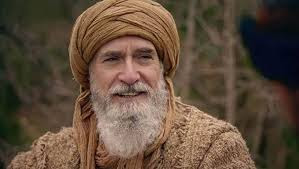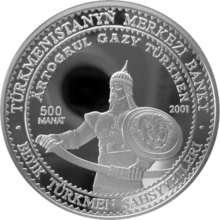Ertugul peer inbne arbi


This article is about the Turkish tribal chief. For the television series based on him, see Diriliş: Ertuğrul. For the ship, see Ottoman frigate Ertuğrul.
| Ertuğrul ارطغرل | |||||
|---|---|---|---|---|---|
| Ghazi | |||||
 Ertuğrul on a 2001 Turkmen coin | |||||
| Uç bey of the Sultanate of Rum | |||||
| Reign | Unknown – c. 1280 | ||||
| Predecessor | Office established | ||||
| Successor | Osman I | ||||
| Born | Unknown | ||||
| Died | c. 1280 Söğüt, Sultanate of Rum | ||||
| Burial | Tomb of Ertuğrul Gazi, Söğüt, Bilecik Province | ||||
| Spouse | Halime Hatun (disputed) | ||||
| Issue | Osman I 2 other sons[1][2] | ||||
| |||||
| Father | Suleyman Shah or Gündüz Alp[3][4] | ||||
| Mother | Hayme Ana[3] | ||||
Ertuğrul or Ertuğrul Gazi (Ottoman Turkish: ارطغرل, romanized: Erṭoġrıl, died c. 1280)[5] was the father of Osman I.[6] Little is known about Ertuğrul's life. According to Ottoman tradition, he was the son of Suleyman Shah, the leader of the Kayı tribe (a claim which has come under criticism from many historians[nb 1]) of Oghuz Turks, who fled from western Central Asia to Anatolia to escape the Mongol conquests, but he may instead have been the son of Gündüz Alp.[3][8] According to this legend, after the death of his father, Ertuğrul and his followers entered the service of the Sultanate of Rum, for which he was rewarded with dominion over the town of Söğüt on the frontier with the Byzantine Empire.[5] This set off the chain of events that would ultimately lead to the founding of the Ottoman Empire.
Nothing is known with certainty about Ertuğrul's life, other than that he was the father of Osman; historians are thus forced to rely upon stories written about him by the Ottomans more than a century later, which are of questionable accuracy.[9][10] An undated coin, supposedly from the time of Osman, with the text "Minted by Osman son of Ertuğrul", suggests that Ertuğrul was a historical figure.[6]:31 Another coin reads "Osman bin Ertuğrul bin Gündüz Alp",[3][4] though Ertuğrul is traditionally considered the son of Suleyman Shah.[8]
In Enveri's Düsturname (1465) and Karamani Mehmet Pasha's chronicle (before 1481), Suleyman Shah replaces Gündüz Alp as Ertugrul's father. After[when?] Ottoman historian Aşıkpaşazade's chronicles, the Suleyman Shah version became the official one.[11] According to many turkish sources, Ertuğrul had three brothers named; Sungur-tekin, Gündoğdu and Dündar.[2] After the death of their father, Ertuğrul with his mother Hayme Hatun, Dündar and his followers from the Kayı Tribe migrated west into Anatolia and entered the Seljuk Sultanate of Rum, leaving his two brothers who took their clans towards the east.[12][13][14] In this way, Kayı Tribe was divided into two parts. According to these later traditions, Ertuğrul was chief of his Kayı Tribe.[5] As a result of his assistance to the Seljuks against the Byzantines, Ertuğrul was granted lands in Karaca Dağ, a mountainous area between Diyarbakır and Urfa, by Kayqubad I, the Seljuk Sultan of Rum. One account indicates that the Seljuk leader's rationale for granting Ertuğrul land was for Ertuğrul to repel any hostile incursion from the Byzantines or other adversary.[15] Later, he received the village of Söğüt which he conquered together with the surrounding lands. That village, where he later died, became the Ottoman capital under his son, Osman I.[4] Osman's mother has been referred to as Halime Hatun in later myths, and there is a grave outside the Ertuğrul Gâzi Tomb which bears the name, but it is disputed.[16][17]
According to many sources, he had two other sons in addition to Osman: Saru-Batu (Savci) Bey[18][4] and Gündüz Bey.[1][11][19] Like his son, Osman, and their descendants, Ertuğrul is often referred to as a Ghazi, a heroic champion fighter for the cause of Islam.[20]

A tomb and mosque dedicated to Ertuğrul is said to have been built by Osman I at Söğüt, but due to several rebuildings nothing certain can be said about the origin of these structures. The current mausoleum was built by sultan Abdul Hamid II in the late 19th century. The town of Söğüt celebrates an annual festival to the memory of the early Osmans.[6]:37[21]
The Ottoman frigate Ertuğrul, launched in 1863, was named after him.[citation needed] The Ertuğrul Gazi Mosque in Ashgabat, Turkmenistan, completed in 1998, is also named in his honor. It was established by the Turkish government as a symbol of the link between Turkey and Turkmenistan.[22]
The last will of Ertugrul Gazi to his son, Osman Gazi, in front of his tomb reads:
Lo, son! Offend me, offend not Shaykh Edebali. He is the light of our clan. His balance does not err by a dirham. Oppose me, oppose him not. If you oppose me, I will be sad and hurt. If you oppose him, my eyes will not look at you, even if they look they will not see. Our words are not for Edebali but for you dear. Consider what I have said my last will.
— Ertuğrul Gazi
Ertugrul has been portrayed in the Turkish television series Kuruluş/Osmancık [tr] (1988), adapted from a novel by the same name,[23] Diriliş: Ertuğrul (2014)[24] and the sequel Kuruluş: Osman (2019).[25]
| This article contains Ottoman Turkish text, written from right to left with some Arabic letters and additional symbols joined. Without proper rendering support, you may see unjoined letters or other symbols. |
- a b c d "ERTUĞRUL GAZİ at TDV İslâm Ansiklopedisi Site - Published in the 11th Volume of İslâm Ansiklopedisi in 1995". islamansiklopedisi.org.tr (in Turkish). Istanbul: TDV İslâm Ansiklopedisi. Retrieved 12 May 2020. 💞 THE GREAT MEN OF HISTORY💞 💞💞💞💞💞💞💞💞💞 💞💞💞💞💞💞💞💞💞💞
if you like it please comment we will always bring beautiful histroy for you ALHAMDULILLAH
Comments
Post a Comment